USAJILI BARANI ULAYA BY JUSTNI LYIMO
How good is he?
Raheem Sterling's Premier League statistics |
||||
|---|---|---|---|---|
| Season | Matches | Goals | Assists | Shots |
| 2014-15 | 35 | 7 | 7 | 62 |
| 2013-14 | 33 | 9 | 5 | 33 |
| 2012-13 | 24 | 2 | 2 | 23 |
Spanish giants Real Madrid were even linked with Sterling after their new manager and ex-Reds coach Rafael Benitez said "we admire Raheem, that's no secret".
A recent study also claimed Sterling was the most valuable young player in Europe and worth £35m, although the forward has yet to win a single trophy.
"Raheem Sterling is a very good young player but he has not yet hit the heights of an Owen, Rooney, Fowler or Giggs at this stage of his career so there's no doubt £49m is a great deal for Liverpool," said former Liverpool vice-captain Carragher.
"It's now time for Raheem to do what he does best - play football and show the Premier League the Sterling who was described as 'the best young player in Europe' just over a year ago. You couldn't argue that fact at the time.
"He has the potential to be a star and one of the leading lights in the national team for years to come as we saw in the Italy game at the World Cup in Brazil."
CHEKI WASTANI WA NYOTE MBALIMBALI NCHINI UNGLANDSterling compared to City players in 2014-15 |
|||||
|---|---|---|---|---|---|
| Sterling | Nasri | Navas | Silva | Toure | |
| Games | 35 | 24 | 35 | 32 | 29 |
| Goals | 7 | 2 | 0 | 12 | 10 |
| Shots | 62 | 16 | 33 | 45 | 64 |
| Accuracy | 53% | 63% | 52% | 60% | 42% |
| Assists | 7 | 6 | 8 | 7 | 1 |
| Passes | 1,133 | 1,229 | 1,338 | 2,146 | 2,414 |
| Pass completion | 81% | 90% | 85% | 86% | 89% |
| Crosses | 81 | 83 | 242 | 62 | 6 |
| Cross completion | 22% | 22% | 25% | 23% | 50% |
| Dribbles | 233 | 37 | 57 | 73 | 68 |
| Dribble completion | 44% | 73% | 65% | 70% | 75% |
Also related to this story
 |
| HUYOO UTUA MAN MSIMU UJAO NI SHIDA |
HATIMAYE CAPELO AFUTWA KAZI
Fabio Capello sacked as Russia head coach after three years
Former England boss Fabio Capello has been sacked as Russia head coach after three years in the role.
The 69-year-old signed a four-year contract extension
in 2014 to keep him under contract until the 2018 World Cup, which will
be staged in Russia.
However his deal has been terminated after a run of poor results.
Russia have eight points from six games in their Euro 2016 qualifying campaign, and face the prospect of needing to win a play-off to reach the tournament.
They were knocked out of the 2014 World Cup in Brazil in the group stage without winning a game.
Bastian Schweinsteiger and Morgan Schneiderlin join Man Utd
Manchester United have completed the double signing of Germany
midfielder Bastian Schweinsteiger and France international Morgan
Schneiderlin.
Schweinsteiger, 30, has signed a three-year contract from Bundesliga champions Bayern Munich for a reported £14.4m.
Schneiderlin has moved from fellow Premier League club Southampton for a fee in the region of £25m.
The 25-year-old midfielder has signed a four-year contract with the option to extend it by a further year.
United have already signed forward Memphis Depay and defender Matteo Darmian this summer and the two new arrivals take their spending to more than £80m.
Schweinsteiger played under United boss Louis van Gaal when the Dutchman managed Bayern between 2009 and 2011.
"I have thoroughly enjoyed my time at Bayern Munich. It has been an incredible journey and I didn't take the decision to leave lightly," said the German. "Manchester United is the only club that I would have left Munich for.
"I feel ready for this new and exciting challenge in what I regard as the most competitive league in the world and I am looking forward to working with Louis van Gaal again."
Schweinsteiger made his Bayern debut in 2002 and appeared 536 times for the club.
He helped his country win the 2014 World Cup and has one Champions League medal, eight Bundesliga titles and seven domestic cups to his name from his time at the German club.
Schneiderlin joined Saints from Strasbourg in 2008 for £1.2m and has played for them in League One, the Championship and the Premier League.
"Once I learned that United were interested in signing me, it was a very easy decision to make," said the Frenchman.
"I have enjoyed seven very happy years with Southampton and it's a club that will always be in my heart. But the chance to be part of this squad to help this great club be successful was too good to miss."
The two will now join their United team-mates when they fly out to the USA on Monday.
The Old Trafford club, who will be based in Seattle for their first game against Mexican team Club America on Friday, have included David De Gea, 24, in the squad, despite the keeper being heavily linked with a move to Real Madrid.
However, his understudy, former Barcelona number one Victor Valdes, 33 is not included.
Argentina internationals Angel Di Maria, 27, and Marcos Rojo, 25 were not selected after playing in the Copa America.
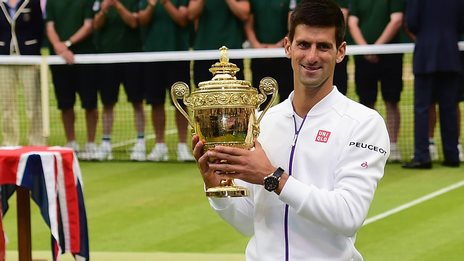
Wimbledon 2015: Novak Djokovic will dominate tennis says McEnroe
By Chris Bevan BBC Sport at Wimbledon
Wimbledon champion Novak Djokovic will win "four or five more Grand
Slams" in the next two years, according to former world number one John
McEnroe.
Djokovic, 28, beat Roger Federer on Sunday
to retain his title, his third at SW19 and his ninth Major in total.
"Novak is just coming into his prime and it is pretty hard not to think that he is getting stronger and stronger," McEnroe told BBC Sport.
"If he stays healthy, he is going to dominate the next couple of years."
Djokovic has been top of the world rankings for the last 53 weeks and has won two out of the three Grand Slams this year, losing in the French Open final.
"He is definitely into my all-time top five," added McEnroe. "My top four are Rod Laver, Pete Sampras, Roger and Rafael Nadal but Novak is at number five and rising.
Tim Henman, four-time Wimbledon semi-finalist |
|---|
| "When you reflect on how Novak has left no stone unturned, his serving has been getting better all the time, his diet, his preparation, it is all first class. |
| "He is in his prime, he is 28, I see him at the top of the game for five or six years. I see him adding to his Grand Slam collection very soon." |
"He could be moving up even further in my eyes, but he has already jumped some people by winning Wimbledon again."
Djokovic's best year since he turned professional in 2003 came in 2011 when he won the Australian Open, Wimbledon and the US Open.
He won only two more majors in the next two-and-a-half years but McEnroe, who won three Wimbledon titles, does not foresee any more lapses in form from the Serbian.
All-time Grand Slam wins |
|
|---|---|
| Player | Total |
| Roger Federer | 17 |
| Rafael Nadal, Pete Sampras | 14 |
| Roy Emerson | 12 |
| Rod Laver, Bjorn Borg | 11 |
| Bill Tilden | 10 |
| Novak Djokovic | 9 |
"He is a better volleyer, he is more resilient defensively, and he is also a better returner.
"Now he is not just able to do that consistently, he also steps in and just crushes the ball.
"I did not think that was possible, but he is more aggressive now when before there were times that he was content to just get it back."
Djokovic also seems settled off the court, celebrating his first wedding anniversary with Jelena during Wimbledon fortnight, and enjoying family life with son Stefan, who was born in October last year.
"He seems supremely motivated," said McEnroe. "His dream must be to win a Calendar Slam, which he can't do this year because he lost in the final in Paris.
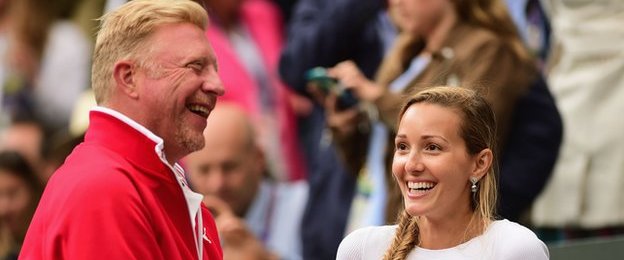
Novak Djokovic's coach Boris Becker and wife Jelena were on hand to watch him win a third Wimbledon title.
"He has got a great team and emotionally he is in a great place so you have got to think he has got a couple more great chances.
"I am always pulling for the top guys to stay healthy so they can maximise their potential. He certainly is right now."
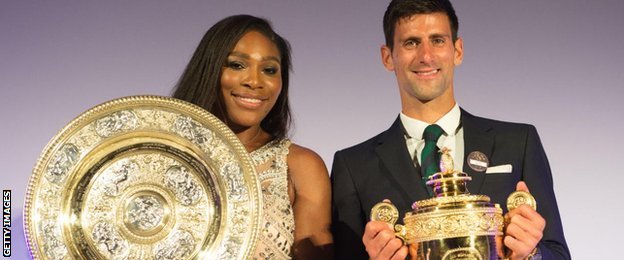
Novak Djokovic with Wimbledon ladies' singles champion Serena Williams
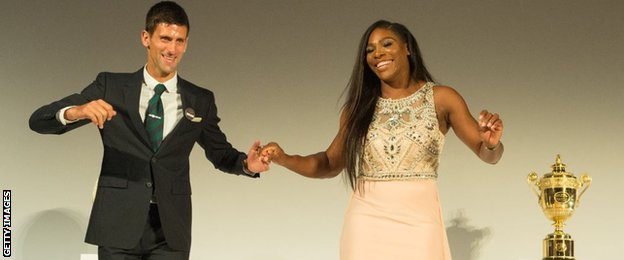
The Wimbledon champions dance together at the Champions Dinner at the Guild Hall
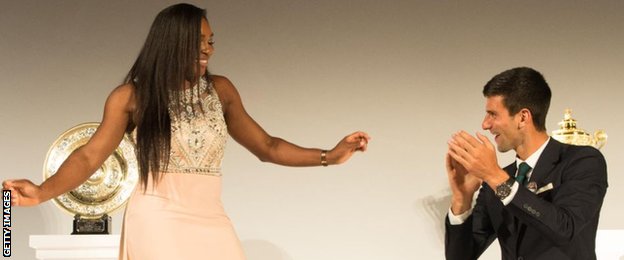
The pair have won nine singles titles at Wimbledon between them
Wimbledon 2015: Serena Williams should be cherished like Federer
There is a phenomenon at
Wimbledon that we might call Federer Face:
that collective glow spread across the chops of spectators as they
leave the show courts having finally seen the 17-time Grand Slam
champion in the smooth-moving flesh.
It's a tiny claim on his greatness, the pleasure in
being somehow part of his sporting story; a tale to tell the grandkids,
the sharing in a communal homage to probably the greatest there has ever
been.
With all Federer has done at Wimbledon, and the style with which he has done it, you can understand the reaction. What makes less logical sense is that the same does not happen to Serena Williams.
There is admiration, of course, and great respect for what she has achieved. But even after her 25th Grand Slam final, there does not seem to be the same desperation to have seen her powers in person. And that, by any reckoning, needs to be put right.
For Serena, arguably, is the most dominant single athlete in sport over the past 15 years.
On Saturday she beat Spain's Garbine Muguruza to win Wimbledon for the sixth time and complete the 'Serena Slam' of holding all four major titles.
In reaching 28 Grand Slam semi-finals she has lost just three. Of those 25 Slam finals, she has won five times as many as she has lost.

Williams won her first Grand Slam in 1999 when she beat Martina Hingis to secure the US Open
To put that into context, there were 12 years between Martina Navratilova's first Grand Slam win and her last. It was the same for Steffi Graf. Margaret Court stretched her peak out to 13, yet she never won another beyond 31 years old.
Federer? He won his first Grand Slam event in 2003 and his last, thus far, in 2012 - a span six years shorter than Serena's. Born within a month of each other, in the last four-and-a-half years, Federer has won one Slam, Serena nine.
That Maria Sharapova has earned more money than Williams despite having been beaten 18 times in their 20 meetings is a sorry reflection both on the calculation of a sportswoman's commercial worth and our own appreciation of what makes a true champion.
"Serena has shown that you can be tough, you can be fearless, you can be courageous, you can be a competitor and you can still be a woman," says former world number one and three-time Grand Slam champion Lindsay Davenport, who spent much of her career battling Williams.
"She was the most intimidating opponent I ever faced. With some players you would be intimidated by their record or their game, like with Steffi Graf. But with Serena you were scared by absolutely everything - her passion, her attitude, how she serves, the power she has, her athleticism.
"She plays tennis at a different level. She is better than any player on tour even if she is only at 80% - and I think she would still win a ton of matches at just 50%."
There is the physical strength of Williams to admire: a serve not only of unprecedented speed but flawless technique, impervious to pressure or occasion. There are groundstrokes whose power gets all the headlines but with a depth and placement that is equally destructive.

Williams suffered from depression and a loss of form that at one point saw her slip to 95th in the world rankings
Martina Hingis is only a year older and yet is reduced to playing occasional doubles, her body wrecked by injury and her love of the game sapped long ago. Justine Henin, a year younger, retired for the second time in 2011. Kim Clijsters, younger again, retired three years ago.
To keep going as Serena has is one miracle. To keep going at the very top is quite another.
"In the middle part of her career, when she went through a real lull, there was a lot for her to overcome," says Davenport, who was beaten by Serena in the final of the 2005 Australian Open.
"Somewhere along the line she was able to flip the switch and get more into how good she actually is. She started to buy into it, but it came at a much later age than it did for some of the other previous champions we've seen.
"During that period when she had eight to 14 Grand Slams she was in no-man's land. I know that sounds ridiculous, but she needed goals and the motivation to break records.
"Once she got past 14 Grand Slam titles, she was like, 'Wait a second here, I'm getting closer to the mark of Chris Evert and Martina Navratilova of 18 and even closer to Steffi Graf's all-time record [in the Open Era].'
"In a weird way it helped too having Federer around, who is still so committed and was still winning Slams and not going anywhere. All of a sudden it became OK to want to compete in your 30s and be able to dominate."
Federer inspires devotion like few other players. It is impossible to imagine him behaving as Serena did in losing the US Open final in 2009 on a foot-fault and penalty point, telling a line judge that she would shove a ball in a place where it is not ordinarily found.
Federer is all control, at least until the point of victory, when ice breaks and the tears flow. Serena is at least three contradictory characters in one - the warrior player, the handbag-designing girlie girl, the insecure body-conscious woman.
She even has names for them: Summer, who is all smiles and thank-you notes; Psycho Serena, the on-court competitor, and then Taquanda, the US Open one, the one you really wouldn't want to be around, tennis ball to hand or not.
Pretentious? Hard to warm to? This is a woman so lacking confidence that she refuses to lift weights because she is worried about making her arms look too big (she uses resistance bands instead), who grew up in the shadow of a more successful elder sister and then had to learn to beat her, who grew up in an area where no-one had ever gone where she was aiming.
"I was never the one that was supposed to be good," she has said of her relationship with Venus, "but I was determined not to be a statistic."
It is the complexity of Serena's character, the thing that seems to put distance between her and some fans, that should instead underscore her achievements.
So perfectionist is she about her tennis that she refuses to play a game in practice in case she loses, and instead insists on playing a succession of unrelated points.
"It's hard and lonely at the top," she has said. "Everyone wants to beat you. Everyone talks behind your back. God forbid I lose. It's like, 'Why?' Well, I am human."

Patrick Mouratoglou became Serena's coach following a first-round defeat in the French Open in 2012
And yet she keeps going, keeps winning, keeps driving.
"It's remarkable what she has been able to achieve in the last three to four years," says Davenport, at Wimbledon as an analyst for BBC Sport.
"You have to give a lot of credit to her coach Patrick Mouratoglou. She was exclusively coached by her parents for so long and wasn't sure that she would ever respect or understand another person's voice, but she let somebody else in and he has got through to her.
"Who knows why? Who knows how? Nobody knows the intricacies of their relationship, but he has got her to believe in herself and to buy into the mantra of, 'You are the greatest player, but you've got to still prove it'.
"Their record is amazing. You can't deny that he has got her to completely invest herself emotionally in just about every tournament she enters. He channels her in the right direction."
That dominance. Take it outside tennis, and who can match her? Tiger Woods won his first major in 1997 and his last in 2008. Cristiano Ronaldo was a 14-year-old kid in Madeira when Serena began her reign, Leo Messi a frail 12-year-old boy.
Kobe Bryant has five NBA rings, but perhaps only Floyd Mayweather, 48 fights unbeaten since his professional debut in 1996, can truly compare. And that is against underdogs and outsiders as well as true contenders. To remain the best, Serena has had to repeatedly beat the best. No easy match-ups, no easy years, no easy titles.
Tough. Fearless. Courageous. A competitor, and still a woman. That is Serena, and that is why we should celebrate her, even as she appears unstoppable, even as she appears forever.
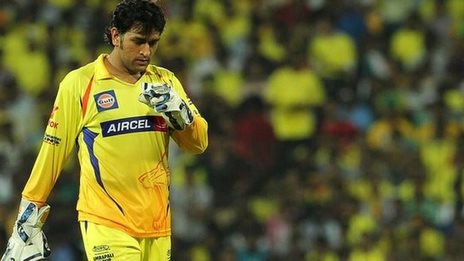


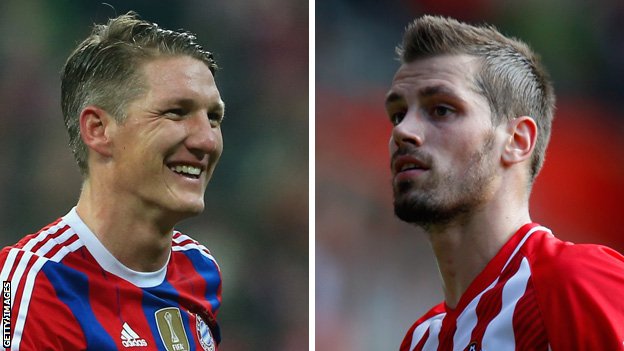
Hakuna maoni:
Chapisha Maoni